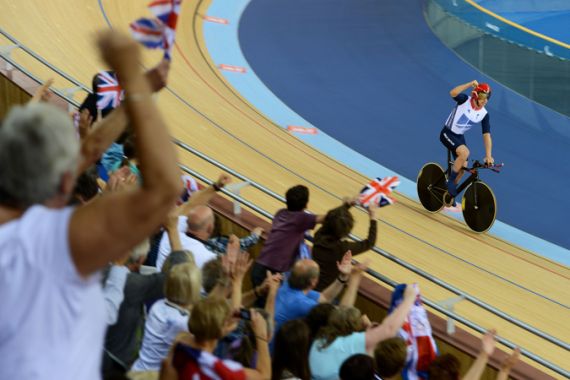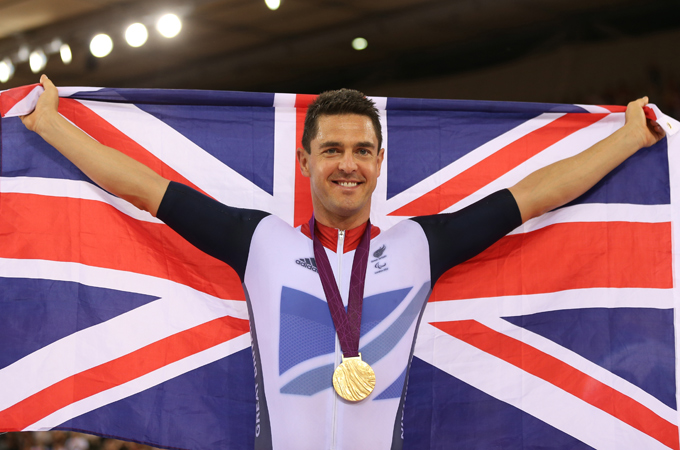In the mind of a champion
Paralympian Mark Colbourne talks to Al Jazeera about ‘digging to the depths of his soul’ to become a champion.

His handsome face graced newspapers, his home town in Wales honoured him by having the traditional British red post box painted gold and he even met the Queen, marking his achievements as world champion and gold and silver medallist at the London 2012 Paralympics.
Mark Colbourne stands tall with a big grin and childlike excitement when talking about his passion.
Keep reading
list of 4 items‘Mama we’re dying’: Only able to hear her kids in Gaza in their final days
Europe pledges to boost aid to Sudan on unwelcome war anniversary
Birth, death, escape: Three women’s struggle through Sudan’s war
He has a muscular physique and thighs probably twice the average size. You can tell he is an athlete – a top one at that. He takes off on his bike like a duck to water.
It is only when he dismounts that you then realise he can barely walk, like a baby learning how to take his first steps, he is wobbly on his feet.
Mark is a Paracyclist and the last three years have been a tough but rewarding journey for him.
In May 2009 Mark was badly injured when his paraglider fell from a height and he was forced to do an emergency landing. The paragliding wing collapsed and folded in front of him. The fall to the ground left him with a broken back and serious lower leg paralysis after he severely damaged nerves in his spine.
Fast-forward to 2012 and Mark became the first British Paralympian to win a silver medal on day one of the Paralympics. He also went on to win a gold and a world title after smashing a record in both the qualification round and final of the C1 3km Individual Pursuit.
Tough road
Mark described the Games as “an amazing experience that will certainly live with me for a long time, a great memory of performing at the home games.
“Even though I read about the Paralympic movement it was still in its infancy and it is still a relatively new event in comparison to the Olympic games,” he continued.
“However it has been a fantastic sporting spectacle for the athletes as we can inspire people around the world. It is incredible for me to take on board the enjoyment of sport and at the same time live life to the full with a disability.”
 |
| Bringing home the bling: Colbourne celebrates his individual cycling C1 pursuit gold in London [GETTY] |
There has been no stopping the former sales executive.
“I was in hospital for nearly six months and it took me 12 gruelling months of intense physiotherapy just to learn how to walk again with walking aids,” he said.
“It was a psychologically testing time; digging into the depths of my soul to ensure that I was going to enjoy the life I have been left with as much as possible. I was given my life back when I started to learn how to ride a bike again; it opened the door for me. Now I don’t feel as severely disabled.”
Mark’s disability is not visible, it is all internal.
Muscular damage becomes apparent when he walks up stairs or slopes. As if rehabilitation was not tough enough, he said “I have no hamstrings or glutes firing and I have what is called a ‘dropped foot’: both feet don’t have any push or pull in them so they tend to be floppy because of the nerve damaged I sustained.”
Now Mark is able to stand upright thanks to customised prosthetics that look like shoehorns and are worn along the front of his ankles and the top of his feet, giving him the balance he needs.
“Through 18 months of cycling, I developed my quad and hip flexor muscles to compensate for all the major muscles that are dysfunctional. Physiologists and coaches in Manchester where I train, have worked with me over the last year to develop these muscles to an exceptionally strong level.”
Despite his natural passion for sport, Mark had originally not thought of cycling.
He initially competed in the Welsh indoor adaptive rowing Championships, while still working part time as a consultant in sales and management. He was then give the chance to cycle and found that despite not being able to walk properly, he was talented riding a bike.
Rio-bound
Mark is now riding high and has his sights on the next Paralympics games in Rio De Janeiro in 2016.
Speaking in the Olympic Velodrome following his win, he said he never imagined he would be able to compete at top level or take home a gold at his first Games.
“Living in a small town as a youngster, working and striving for everything is what spurred me on after my life changing accident,” he said.
|
“We only live a short life, so accepting my disability and overcoming adversity by taking onboard a strong positive attitude was integral.“ – Mark Colbourne |
“We only live a short life, so accepting my disability and overcoming adversity by taking onboard a strong positive attitude was integral. When I raced, won medals and broke a world record, it showed I was in the best kind of shape I could be and in such a short space of time”.
Mark tells us that despite his age, he has plans for Rio 2016 and has already started working towards that goal.
“I’m 42 now but that doesn’t stop me from training full time. Unlike the first time round, I now have the luxury of four years to train and get ready for 2016; it’s a fantastic opportunity.
Two years ago he had a dream of professional cycling and all his hard work has paid off.
“It shows people that there is nothing wrong in trying to achieve the ultimate number one accolade, the Paralympic gold medal is the highest you can achieve,” he said.
After his accident, he thought long and hard about life and what it is that makes him happy. It was not “vice or materialistic things” rather his family and his health.
It was this which spurred him on to the road of recovery, giving him that air of determination and positivity one can feel when speaking to him.
“You have to have a passion in life, whatever it is, sports or a hobby,” he said.
“If you feel you want to achieve something very special then have a plan and stick to it. Never give up.”
His training tips are to work hard, always rest but most importantly be patient and the gains will come.
Where he is now, is only just the beginning to a road of success both in his athletic life and in his personnel achievement of overcoming a disability.
His courage and endurance is remarkable and he has become an inspiring sports ambassador and role model.
You can find out more about Mark Colbourne at www.markcolbourne.com
Al Jazeera is not responsible for the content of external websites.